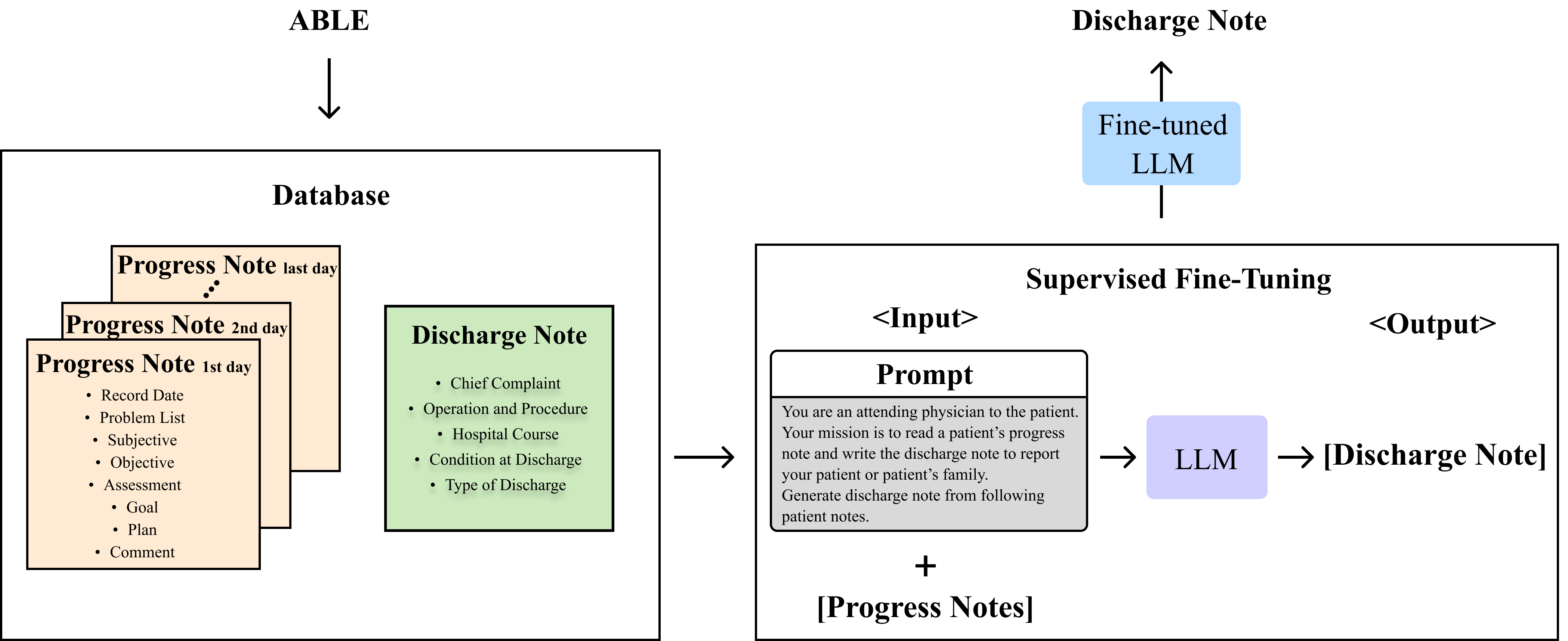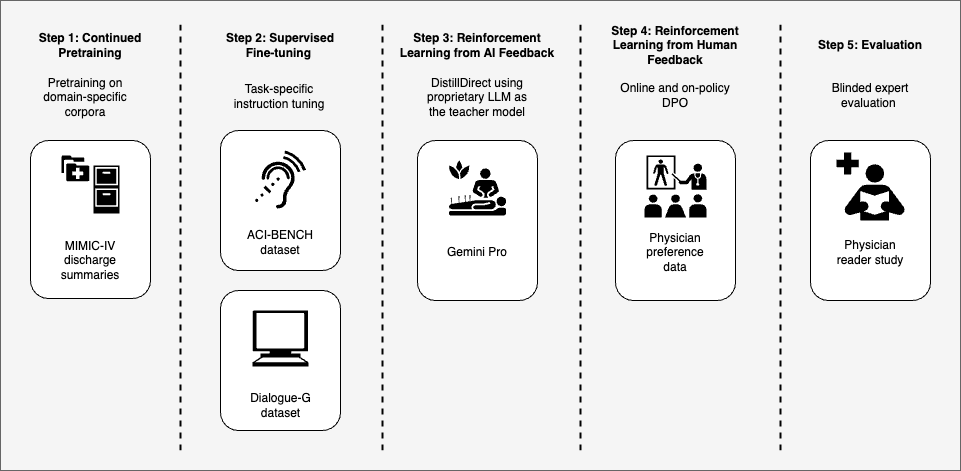Intelligent Clinical Documentation: Harnessing Generative AI for Patient-Centric Clinical Note Generation
2405.18346

0
0
🤖
Abstract
Comprehensive clinical documentation is crucial for effective healthcare delivery, yet it poses a significant burden on healthcare professionals, leading to burnout, increased medical errors, and compromised patient safety. This paper explores the potential of generative AI (Artificial Intelligence) to streamline the clinical documentation process, specifically focusing on generating SOAP (Subjective, Objective, Assessment, Plan) and BIRP (Behavior, Intervention, Response, Plan) notes. We present a case study demonstrating the application of natural language processing (NLP) and automatic speech recognition (ASR) technologies to transcribe patient-clinician interactions, coupled with advanced prompting techniques to generate draft clinical notes using large language models (LLMs). The study highlights the benefits of this approach, including time savings, improved documentation quality, and enhanced patient-centered care. Additionally, we discuss ethical considerations, such as maintaining patient confidentiality and addressing model biases, underscoring the need for responsible deployment of generative AI in healthcare settings. The findings suggest that generative AI has the potential to revolutionize clinical documentation practices, alleviating administrative burdens and enabling healthcare professionals to focus more on direct patient care.
Create account to get full access
Overview
- Highlights the importance of clinical documentation in healthcare
- Explores the potential of generative AI to streamline the clinical documentation process
- Focuses on generating SOAP (Subjective, Objective, Assessment, Plan) and BIRP (Behavior, Intervention, Response, Plan) notes
- Presents a case study demonstrating the application of natural language processing (NLP) and automatic speech recognition (ASR) technologies
- Discusses ethical considerations and the need for responsible deployment of generative AI in healthcare settings
Plain English Explanation
Accurate and comprehensive clinical documentation is crucial for providing effective healthcare, but it can be a significant burden on healthcare professionals. This can lead to burnout, increased medical errors, and compromised patient safety. The researchers in this study explore how generative AI can be used to streamline the clinical documentation process.
Specifically, the researchers focus on using natural language processing (NLP) and automatic speech recognition (ASR) technologies to transcribe patient-clinician interactions and then generate draft clinical notes, such as SOAP (Subjective, Objective, Assessment, Plan) and BIRP (Behavior, Intervention, Response, Plan) notes, using large language models (LLMs). This approach has the potential to save time, improve the quality of documentation, and allow healthcare professionals to focus more on direct patient care.
The researchers also discuss the ethical considerations of using generative AI in healthcare, such as maintaining patient confidentiality and addressing potential model biases. They emphasize the need for responsible deployment of these technologies to ensure patient safety and protect patient privacy.
Overall, the findings suggest that generative AI has the potential to revolutionize clinical documentation practices, alleviating administrative burdens and enabling healthcare professionals to provide better-quality, more patient-centered care.
Technical Explanation
The researchers in this study explore the use of generative AI to streamline the clinical documentation process, focusing on the generation of SOAP (Subjective, Objective, Assessment, Plan) and BIRP (Behavior, Intervention, Response, Plan) notes.
The researchers present a case study that demonstrates the application of natural language processing (NLP) and automatic speech recognition (ASR) technologies to transcribe patient-clinician interactions. These transcriptions are then used as input to advanced prompting techniques, which leverage large language models (LLMs) to generate draft clinical notes.
The study highlights the benefits of this approach, including time savings, improved documentation quality, and enhanced patient-centered care. Additionally, the researchers discuss the ethical considerations of using generative AI in healthcare, such as maintaining patient confidentiality and addressing model biases. They emphasize the need for responsible deployment of these technologies to ensure patient safety and protect patient privacy.
The findings suggest that generative AI has the potential to revolutionize clinical documentation practices, alleviating administrative burdens and enabling healthcare professionals to focus more on direct patient care.
Critical Analysis
The paper presents a promising approach to using generative AI to streamline clinical documentation, but it also raises some important considerations and potential limitations.
One key concern is the need to ensure the accuracy and reliability of the generated clinical notes. While the researchers highlight improvements in documentation quality, it is essential to thoroughly validate the generated notes to avoid any potential medical errors or patient harm. Rigorous testing and verification processes will be crucial for the responsible deployment of these technologies in healthcare settings.
Additionally, the researchers acknowledge the need to address model biases and maintain patient confidentiality. This is a critical challenge, as healthcare data can be highly sensitive and vulnerable to privacy breaches. Developing robust data privacy and security protocols will be essential to build trust and protect patient rights.
Further research is also needed to understand the long-term impacts of using generative AI for clinical documentation. Potential issues, such as clinician over-reliance on the technology or the erosion of clinical reasoning skills, should be carefully examined and addressed.
Overall, the research presents a promising step forward in bridging medical jargon and lay understanding for patients, but continued vigilance and a commitment to responsible innovation will be necessary to ensure the safe and effective deployment of these technologies in healthcare.
Conclusion
This study explores the potential of generative AI to streamline the clinical documentation process, with a focus on generating SOAP and BIRP notes. The researchers present a case study demonstrating the application of NLP and ASR technologies to transcribe patient-clinician interactions and generate draft clinical notes using LLMs.
The findings suggest that this approach can provide significant time savings, improve documentation quality, and enable healthcare professionals to focus more on direct patient care. However, the researchers also highlight the importance of addressing ethical considerations, such as maintaining patient confidentiality and addressing model biases, to ensure the responsible deployment of these technologies in healthcare settings.
Overall, the study highlights the potential of generative AI to revolutionize clinical documentation practices and alleviate the administrative burden on healthcare professionals. As the use of these technologies continues to evolve, ongoing research and a commitment to responsible innovation will be crucial to unlock the full benefits of generative AI in healthcare.
This summary was produced with help from an AI and may contain inaccuracies - check out the links to read the original source documents!
Related Papers
🎯
Enhancing Clinical Documentation with Synthetic Data: Leveraging Generative Models for Improved Accuracy
Anjanava Biswas, Wrick Talukdar

0
0
Accurate and comprehensive clinical documentation is crucial for delivering high-quality healthcare, facilitating effective communication among providers, and ensuring compliance with regulatory requirements. However, manual transcription and data entry processes can be time-consuming, error-prone, and susceptible to inconsistencies, leading to incomplete or inaccurate medical records. This paper proposes a novel approach to augment clinical documentation by leveraging synthetic data generation techniques to generate realistic and diverse clinical transcripts. We present a methodology that combines state-of-the-art generative models, such as Generative Adversarial Networks (GANs) and Variational Autoencoders (VAEs), with real-world clinical transcript and other forms of clinical data to generate synthetic transcripts. These synthetic transcripts can then be used to supplement existing documentation workflows, providing additional training data for natural language processing models and enabling more accurate and efficient transcription processes. Through extensive experiments on a large dataset of anonymized clinical transcripts, we demonstrate the effectiveness of our approach in generating high-quality synthetic transcripts that closely resemble real-world data. Quantitative evaluation metrics, including perplexity scores and BLEU scores, as well as qualitative assessments by domain experts, validate the fidelity and utility of the generated synthetic transcripts. Our findings highlight synthetic data generation's potential to address clinical documentation challenges, improving patient care, reducing administrative burdens, and enhancing healthcare system efficiency.
6/12/2024

Enhancing Clinical Efficiency through LLM: Discharge Note Generation for Cardiac Patients
HyoJe Jung, Yunha Kim, Heejung Choi, Hyeram Seo, Minkyoung Kim, JiYe Han, Gaeun Kee, Seohyun Park, Soyoung Ko, Byeolhee Kim, Suyeon Kim, Tae Joon Jun, Young-Hak Kim

0
0
Medical documentation, including discharge notes, is crucial for ensuring patient care quality, continuity, and effective medical communication. However, the manual creation of these documents is not only time-consuming but also prone to inconsistencies and potential errors. The automation of this documentation process using artificial intelligence (AI) represents a promising area of innovation in healthcare. This study directly addresses the inefficiencies and inaccuracies in creating discharge notes manually, particularly for cardiac patients, by employing AI techniques, specifically large language model (LLM). Utilizing a substantial dataset from a cardiology center, encompassing wide-ranging medical records and physician assessments, our research evaluates the capability of LLM to enhance the documentation process. Among the various models assessed, Mistral-7B distinguished itself by accurately generating discharge notes that significantly improve both documentation efficiency and the continuity of care for patients. These notes underwent rigorous qualitative evaluation by medical expert, receiving high marks for their clinical relevance, completeness, readability, and contribution to informed decision-making and care planning. Coupled with quantitative analyses, these results confirm Mistral-7B's efficacy in distilling complex medical information into concise, coherent summaries. Overall, our findings illuminate the considerable promise of specialized LLM, such as Mistral-7B, in refining healthcare documentation workflows and advancing patient care. This study lays the groundwork for further integrating advanced AI technologies in healthcare, demonstrating their potential to revolutionize patient documentation and support better care outcomes.
4/9/2024
🤖
Rapid Review of Generative AI in Smart Medical Applications
Yuan Sun, Jorge Ortiz

0
0
With the continuous advancement of technology, artificial intelligence has significantly impacted various fields, particularly healthcare. Generative models, a key AI technology, have revolutionized medical image generation, data analysis, and diagnosis. This article explores their application in intelligent medical devices. Generative models enhance diagnostic speed and accuracy, improving medical service quality and efficiency while reducing equipment costs. These models show great promise in medical image generation, data analysis, and diagnosis. Additionally, integrating generative models with IoT technology facilitates real-time data analysis and predictions, offering smarter healthcare services and aiding in telemedicine. Challenges include computational demands, ethical concerns, and scenario-specific limitations.
6/12/2024

Towards Adapting Open-Source Large Language Models for Expert-Level Clinical Note Generation
Hanyin Wang, Chufan Gao, Bolun Liu, Qiping Xu, Guleid Hussein, Mohamad El Labban, Kingsley Iheasirim, Hariprasad Korsapati, Chuck Outcalt, Jimeng Sun

0
0
Proprietary Large Language Models (LLMs) such as GPT-4 and Gemini have demonstrated promising capabilities in clinical text summarization tasks. However, due to patient data privacy concerns and computational costs, many healthcare providers prefer using small, locally-hosted models over external generic LLMs. This study presents a comprehensive domain- and task-specific adaptation process for the open-source LLaMA-2 13 billion parameter model, enabling it to generate high-quality clinical notes from outpatient patient-doctor dialogues. Our process incorporates continued pre-training, supervised fine-tuning, and reinforcement learning from both AI and human feedback. We introduced a new approach, DistillDirect, for performing on-policy reinforcement learning with Gemini 1.0 Pro as the teacher model. Our resulting model, LLaMA-Clinic, can generate clinical notes comparable in quality to those authored by physicians. In a blinded physician reader study, the majority (90.4%) of individual evaluations rated the notes generated by LLaMA-Clinic as acceptable or higher across all three criteria: real-world readiness, completeness, and accuracy. In the more challenging Assessment and Plan section, LLaMA-Clinic scored higher (4.2/5) in real-world readiness than physician-authored notes (4.1/5). Our cost analysis for inference shows that our LLaMA-Clinic model achieves a 3.75-fold cost reduction compared to an external generic LLM service. Additionally, we highlight key considerations for future clinical note-generation tasks, emphasizing the importance of pre-defining a best-practice note format, rather than relying on LLMs to determine this for clinical practice. We have made our newly created synthetic clinic dialogue-note dataset and the physician feedback dataset publicly available to foster future research.
6/11/2024